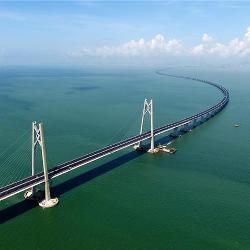Macau Casino Revenue in September Plummets to Two Year Low

Figures released today by Macau’s Gaming Inspection and Coordination Bureau (DICJ) show casino revenue higher by just 2.8% at $2.73 billion in September, with the industry having been severely hit by the fallout from Typhoon Mangkhut. While its actual damage was described as “immaterial”, the government forced casinos to shut down their operations for a 33-hour period, and as Union Gaming analyst Grant Govertsen explains:
“With the benefit of hindsight, and in the context of the damage in Hong Kong being much more severe than in Macau, we believe the period of time that was needed to get casinos back to normal extended well beyond the Monday morning re-openings.”
Typhoon Mangkhut
Typhoon Mangkhut was the world’s most powerful tropical cyclone of the year so far, and affected the Philippines, Taiwan, Mainland China, as well as the island’s of Hong Kong and Macau. During the weekend of September 15/16th, 191 flights were cancelled in and out of Macau International Airport, while all 42 of the island’s casinos were closed during the period, which was the first time they have been required to do so since first being issued gambling licenses in 2002.
Although the damage caused by Typhoon Mangkhut was not as severe as had been expected, around 21,000 homes still lost power in Macau, while 40 people were injured. In total, it is estimated that the powerful typhoon cost the resort’s casino industry around US$186 million.
Macau Casinos Up 2.8%
The $2.73 billion generated by casinos in September represents a 17.3% decrease compared to August’s figure of $3.3 billion. In terms of year-on-year revenue, analysts had originally forecast a growth rate of between 6-12%, but in the end Typhoon Mangkhut caused its result to come in much lower at just 2.8%.
“The typhoon and post-typhoon impacted exceeded our initial expectations, which we attribute in part to a much more severe impact to Hong Kong while Macau was relatively spared,” explained Union Gaming.
In other words, the typhoon severely disrupted Macau’s weekend tourist trade from mainland China traveling via Hong Kong located just 62.2 km away. Nevertheless, September’s result still strings together 26 consecutive months of GGR growth for the world’s biggest gaming hub, and furthermore its market is currently up by +15.9% year-on-year for the first nine months of 2018.
Golden Week
During the first week of October the whole country celebrates a festivity known as the National Day Golden Week, which marks the founding of the People’s Republic of China on 1 October 1949. Needless to say, Macau is one of a number of destinations expecting a major influx of tourists during the celebrations, with Union Gaming analysts forecasting a 7% growth rate to $3.5 billion for the month.
According to the latest figures, however, Macau’s 3-to-5-star hotels are currently showing an average booking rate of 40%, down from the 80% recorded around the same time in 2017. That is in spite of hotels charging between double and triple their usual prices this year, compared to last year when some rooms were listed at five times their usual rates.
Macau-Hong Kong Bridge
Macau’s casino market will receive another major boost starting October after the Hong Kong-Zhuhai Macau Bridge (HZMB) opens officially linking the three cities. Construction on the project began in 2011, but delays related to workplace accidents, technical obstacles, and even a corruption investigation ultimately pushed back its opening until this month.
Nonetheless, an official opening has now been confirmed, with three days of drills carried out in order to ensure all aspects of the bridge’s route are fully operational, including “signalling, computer systems, passenger capacity and customs clearance.”
The 55km (34-mile) long HZMB bridge cost almost $2 billion to build, with 44.5% of that amount contributed by the central government, and the rest by the Hong Kong and Macau governments. Up until now, it has taken 4.5 hours to travel from Hong Kong to Zhuhai or Macau, but following its opening that journey will be reduced to a mere 40 minutes. Instead of having to fork out HK$220 (US$28) for a ferry ride, or HK$130 (US$16) for a coach, travelers using the bridge will also see their cost of travel reduced to just HK$80 (US$10).
In addition to dramatically reducing travel times, the huge development is expected to push up property prices in Macau, narrowing the gap between itself and Hong Kong whose market has started to cool recently. According to Raymond Kwok, associate director at Guo Du Real Estate, Macau could see its residential property market increase in value by between 5-10%, rising to more than 30% for its retail properties.







